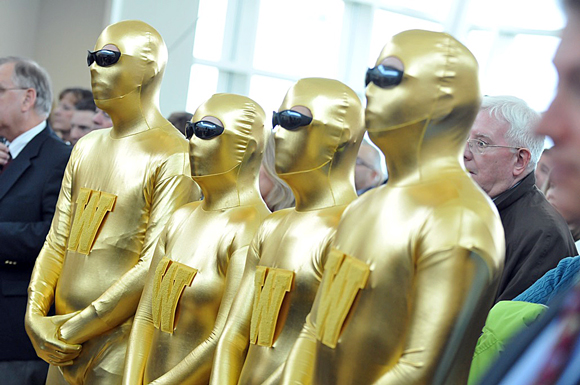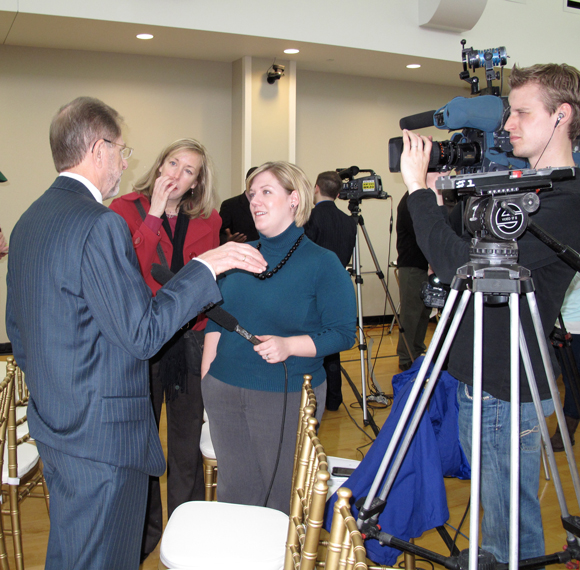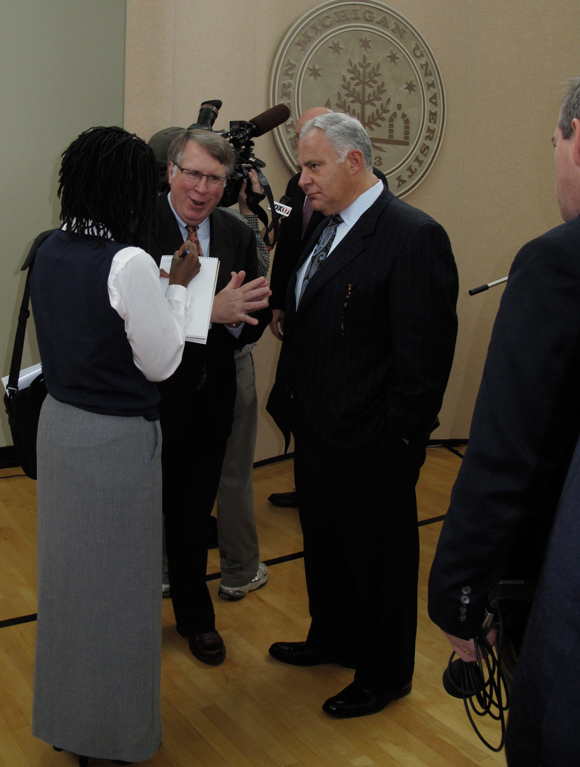WMU grateful for $100 million cash gift for med school
The WMU School of Medicine is scheduled to open in the fall of 2013 or 2014. A $100 million anonymous donation has made the whole endeavor a whole lot more real.
Overheard: “I’ve lived in Kalamazoo for 10 years and it just keeps getting better.”
Anonymous has been very good to Kalamazoo.
In what has become a repeated event, but always a welcome one, a gift the beneficiaries rightly describe as “transformational” for the community goes this time to Western Michigan University.
On March 22 WMU announced a donor who wishes to remain anonymous has given a $100 million cash gift to Western. The money will be used to make sure the university’s medical school has the financial means to be properly launched.
The school of medicine is being developed in partnership with Borgess Health and Bronson Health Care, both of which have 35 years experience training medical students.
The announcement before a full house on Western’s campus was greeted with a standing ovation and a long round of applause. It came after two weeks of hints from the school that something big was about to happen.
Theater students in gold added to the suspense by turning up at events on campus, across town and as far away as Detroit’s Joe Lewis arena where they rode the Zamboni and dropped clues about what WMU called Operation Historic Moment.
It’s the 15th largest cash gift to all American universities and colleges and the seventh largest given to American public universities. WMU President John Dunn says not even Harvard, Yale or Princeton have received a cash gift of this size.
This is also the second anonymous gift to go to the medical school. An earlier $1.8 million was given to WMU so the accreditation process for the med school could begin.
WMU says it needs at least $175 million, but probably closer to $300 million to open the school of medicine and endow it properly. Currently, there are no buildings on campus that can house the school and a facilities committee is one of many looking at options for the school.
Dr. Hal Jenson, medical school dean, says one of the toughest questions posed by the body that accredits medical schools — the Liaison Committee on Medical Education (LCME) — is how can it be assured the medical school will be around more than a few years, considering tuition alone is never enough to cover the cost of a medical school.
“This gift takes that really hard question and gives it a slam dunk answer,” Jenson says.
The gift is another sign “this is a wonderful community,” Jeson says and it confirms his and his family’s decision to move to Kalamazoo. He started work at WMU the day of the announcement. “I doubt any new dean of a new medical school has experienced exactly what I have on my first day.”
As part of the announcement, Dunn adressed the reasons WMU is pursing a medical school at this time. “We know our nation faces a real shortage in terms of available physicians in Michigan and the United States,” Dunn says.
The Association of American Medical Colleges (AAMC) backs up such statements. It projects by 2025 there could be a shortage of at least 124,500 too few doctors. The shortage is expected to be brought about by the combined affect of an aging population with more medical needs, health care reforms that expand coverage to those who previously did not see a doctor, and the retirement of about one-third of currently practicing physicians.
AAMC also points out that if more residencies are not created the doctor shortage will not be eased by graduating more medical students. In recognition of that, federal agency, Health and Human Services, released $167.3 million in grants in the fall of 2010 to create an additional 889 primary care residency slots by 2015.
WMU’s medical school not only will provide doctors to help ease the shortage, it also has the opportunity to be an innovator, as Dunn repeatedly refers to it. The standards that have ruled medical school curriculum for decades have recently been revised to allow for inclusion of such areas of study as the latest research on the human genome, personalized medicine, and teams of professionals working together, all of which open up opportunities for schools that want to innovate.
Throughout the morning event there also was the growing sense that what was historic about the event was not the gift itself, but what it means for the community.
Those who have living in Kalamazoo for many years may remember a time when people predicted as soon as the Upjohn Co. was sold Kalamazoo would wither away and die. That the community survived that transition with none of the direst predictions coming true is only part of the story.
To the contrary, the overwhelming generosity of benefactors who give willingly to better the community and the community’s commitment to build on its heritage and at the same time make changes as needed has made it a model in a nation where reinvention has become the driving economic theme.
The Kalamazoo Promise changed the way Kalamazoo looked at its responsibility to prepare its young people for college and offered hope to those who never considered secondary education. Community pride reached new levels when President Barak Obama appeared at Kalamazoo Central’s graduation, thanks in part to The Promise.
Now comes the gift to the medical school that builds on Kalamazoo’s life sciences background fostered by the Upjohns, carried on by the scientists the pharmaceutical industry brought to town now working in local start-up companies, and supported by the Strykers with their innovations in manufactured medical devices and medical equipment.
As Dunn says: This is not just a gift to Western Michigan University it is a gift to our entire community and region.
Kathy Jennings is the editor of Southwest Michigan’s Second Wave. She is a freelance writer and editor living in Kalamazoo.
Photos:
The Gold Men and Women, Western theater students, traveled across the community and state building anticipation for WMU’s Operation Historic Moment. Photo for WMU by Mike Lanka
WMU President John Dunn answers questions about the $100 million cash gift to the university specifically for the establishment of the school of medicine. Photo by Kathy Jennings
Reporter Paula Davis talks with Paule Spaude of Borgess and Frank Sardone of Bronson, the CEOs of the two hospitals that are partners with WMU in the medical school. Photo by Kathy Jennings


















